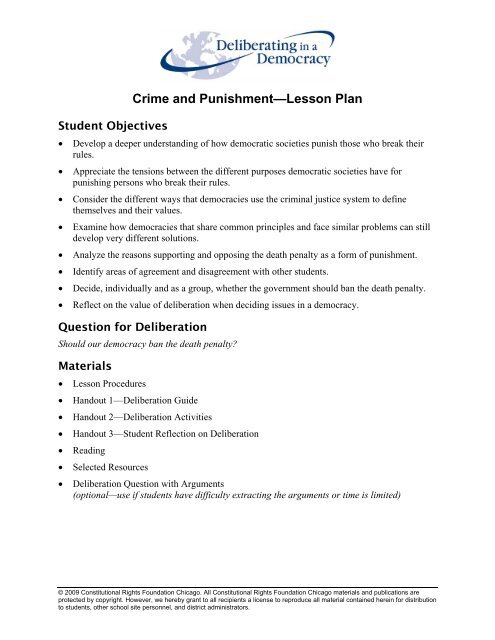Crime and PunishmentâLesson Plan - Deliberating in a Democracy
Crime and PunishmentâLesson Plan - Deliberating in a Democracy
Crime and PunishmentâLesson Plan - Deliberating in a Democracy
Create successful ePaper yourself
Turn your PDF publications into a flip-book with our unique Google optimized e-Paper software.
Student Objectives<br />
<br />
<br />
<br />
<br />
<br />
<br />
<br />
<br />
<strong>Crime</strong> <strong>and</strong> Punishment—Lesson <strong>Plan</strong><br />
Develop a deeper underst<strong>and</strong><strong>in</strong>g of how democratic societies punish those who break their<br />
rules.<br />
Appreciate the tensions between the different purposes democratic societies have for<br />
punish<strong>in</strong>g persons who break their rules.<br />
Consider the different ways that democracies use the crim<strong>in</strong>al justice system to def<strong>in</strong>e<br />
themselves <strong>and</strong> their values.<br />
Exam<strong>in</strong>e how democracies that share common pr<strong>in</strong>ciples <strong>and</strong> face similar problems can still<br />
develop very different solutions.<br />
Analyze the reasons support<strong>in</strong>g <strong>and</strong> oppos<strong>in</strong>g the death penalty as a form of punishment.<br />
Identify areas of agreement <strong>and</strong> disagreement with other students.<br />
Decide, <strong>in</strong>dividually <strong>and</strong> as a group, whether the government should ban the death penalty.<br />
Reflect on the value of deliberation when decid<strong>in</strong>g issues <strong>in</strong> a democracy.<br />
Question for Deliberation<br />
Should our democracy ban the death penalty<br />
Materials<br />
<br />
<br />
<br />
<br />
<br />
<br />
<br />
Lesson Procedures<br />
H<strong>and</strong>out 1—Deliberation Guide<br />
H<strong>and</strong>out 2—Deliberation Activities<br />
H<strong>and</strong>out 3—Student Reflection on Deliberation<br />
Read<strong>in</strong>g<br />
Selected Resources<br />
Deliberation Question with Arguments<br />
(optional—use if students have difficulty extract<strong>in</strong>g the arguments or time is limited)<br />
© 2009 Constitutional Rights Foundation Chicago. All Constitutional Rights Foundation Chicago materials <strong>and</strong> publications are<br />
protected by copyright. However, we hereby grant to all recipients a license to reproduce all material conta<strong>in</strong>ed here<strong>in</strong> for distribution<br />
to students, other school site personnel, <strong>and</strong> district adm<strong>in</strong>istrators.
<strong>Crime</strong> <strong>and</strong> Punishment—Read<strong>in</strong>g<br />
1<br />
2<br />
Every society has laws def<strong>in</strong><strong>in</strong>g crimes. Every society punishes people who commit those<br />
crimes. But how should the state punish the guilty Consider these four cases:<br />
3<br />
4<br />
5<br />
6<br />
7<br />
8<br />
9<br />
<br />
Milada Horakova was a Czechoslovakian politician who resisted the Nazis dur<strong>in</strong>g World<br />
War II. The Nazis captured <strong>and</strong> imprisoned her. After the war, she returned to her country<br />
<strong>and</strong> served <strong>in</strong> Parliament. She resigned her seat after the communist coup <strong>in</strong> 1948. With<strong>in</strong> 18<br />
months, she was arrested on charges of attempt<strong>in</strong>g to overthrow the government. She was<br />
tried publicly <strong>in</strong> a show trial. Despite a lack of evidence, she was found guilty of treason.<br />
Horakova was hanged on June 27, 1950. Today she is recognized as a national hero<strong>in</strong>e <strong>in</strong> the<br />
Czech Republic.<br />
10<br />
11<br />
12<br />
13<br />
14<br />
15<br />
16<br />
17<br />
18<br />
19<br />
<br />
On January 7, 1965, Mildred Weiss, a mother of two, was return<strong>in</strong>g to her home <strong>in</strong> San<br />
Gabriel, California, when she was confronted <strong>and</strong> shot by Robert Lee Massie. Weiss was<br />
only one of Massie’s victims dur<strong>in</strong>g a seven-day crime spree. Massie was arrested; convicted<br />
of robbery, attempted murder, <strong>and</strong> murder; <strong>and</strong> sentenced to death. Hours before his<br />
scheduled execution, a stay was issued so that Massie could testify aga<strong>in</strong>st his accomplice.<br />
Massie's sentence was later commuted to life <strong>in</strong> prison when the U.S. Supreme Court<br />
temporarily halted executions <strong>in</strong> 1972. He was eventually paroled. Eight months later, he<br />
robbed <strong>and</strong> murdered bus<strong>in</strong>essman Boris Naumoff <strong>in</strong> San Francisco, California. More than<br />
36 years after he murdered Mildred Weiss, Massie was executed <strong>in</strong> March 2001 by the State<br />
of California.<br />
© 2009 Constitutional Rights Foundation Chicago. All Constitutional Rights Foundation Chicago materials <strong>and</strong> publications are<br />
protected by copyright. However, we hereby grant to all recipients a license to reproduce all material conta<strong>in</strong>ed here<strong>in</strong> for distribution<br />
to students, other school site personnel, <strong>and</strong> district adm<strong>in</strong>istrators.
20<br />
21<br />
22<br />
23<br />
24<br />
25<br />
<br />
In 1995, the State of North Carol<strong>in</strong>a sentenced Alan Gell to death for the crime of firstdegree<br />
murder. Gell ma<strong>in</strong>ta<strong>in</strong>ed his <strong>in</strong>nocence while serv<strong>in</strong>g n<strong>in</strong>e years on death row. His<br />
appeal revealed that the prosecution had withheld significant evidence prov<strong>in</strong>g Gell’s<br />
<strong>in</strong>nocence. Upon his exoneration, Gell <strong>and</strong> his family were jubilant. “We f<strong>in</strong>ally got the<br />
truth,” said Gell’s stepfather. “We have felt sure he was not guilty…It was a hard fight. You<br />
can’t w<strong>in</strong> a fight when the other side makes up the evidence.”<br />
26<br />
27<br />
28<br />
29<br />
30<br />
<br />
In 1998, 29-year-old drug addict Roman Postl was convicted of murder<strong>in</strong>g fellow Czech Jan<br />
Stencl. Postl was sentenced to 13 years <strong>in</strong> prison. He was released early, <strong>in</strong> 2008, because of<br />
his good behavior. Over three days <strong>in</strong> September 2008, Postl murdered four men, <strong>in</strong>clud<strong>in</strong>g a<br />
police officer who tried to stop him. Another police officer shot Postl, who died of his<br />
wounds later that month.<br />
31<br />
In a democracy, there are limits on how the government can punish persons convicted of<br />
32<br />
33<br />
34<br />
35<br />
36<br />
37<br />
38<br />
39<br />
40<br />
crimes. The government must follow laws <strong>and</strong> procedures approved by the people. Almost all<br />
democracies, for example, forbid torture or cruel punishments for prisoners. There are dramatic<br />
differences, however, regard<strong>in</strong>g capital punishment—both with<strong>in</strong> <strong>and</strong> among democracies.<br />
Capital Punishment<br />
Capital punishment, or the death penalty, is the lawful execution of a convicted crim<strong>in</strong>al by<br />
the government. Those crimes punishable by death are known as “capital crimes.” Sixty-two<br />
countries, <strong>in</strong>clud<strong>in</strong>g India, Pakistan, Cuba, Japan, Iran, Iraq, Ch<strong>in</strong>a, Saudi Arabia, <strong>and</strong> the United<br />
States, reta<strong>in</strong> the death penalty. In 2007, Ch<strong>in</strong>a executed 470 people, the most performed <strong>in</strong> a<br />
s<strong>in</strong>gle country, whereas Iran executed 317 <strong>and</strong> the United States executed 42.<br />
<strong>Deliberat<strong>in</strong>g</strong> <strong>in</strong> a <strong>Democracy</strong> © 2009 Constitutional Rights Foundation Chicago. 2
41<br />
42<br />
43<br />
44<br />
45<br />
46<br />
47<br />
48<br />
49<br />
50<br />
51<br />
52<br />
53<br />
54<br />
55<br />
56<br />
57<br />
58<br />
59<br />
60<br />
61<br />
Many democracies have abolished the death penalty on the pr<strong>in</strong>ciple that execut<strong>in</strong>g any<br />
person is dehumaniz<strong>in</strong>g, even if that person was convicted of the worst k<strong>in</strong>ds of crime. N<strong>in</strong>etyone<br />
countries prohibit capital punishment, <strong>in</strong>clud<strong>in</strong>g Azerbaijan, Serbia, Ukra<strong>in</strong>e, <strong>and</strong> the United<br />
K<strong>in</strong>gdom. The European Union’s Charter of Fundamental Rights states, “No one shall be<br />
condemned to the death penalty, or executed.” Protocol 6 of the European Convention on Human<br />
Rights states that the death penalty “shall be abolished” except <strong>in</strong> times of war. All member<br />
states except the Russian Federation have ratified Protocol 6, <strong>and</strong> Russia no longer uses the death<br />
penalty. The International Crim<strong>in</strong>al Tribunals for the former Yugoslavia <strong>and</strong> for Rw<strong>and</strong>a did not<br />
consider the option of capital punishment, even though the tribunals were hear<strong>in</strong>g charges of<br />
genocide, the systematic mass murder of an entire national, ethnic, or cultural group.<br />
Despite European governments’ disapproval of capital punishment, some polls show that<br />
many European people support the death penalty. Poll<strong>in</strong>g conducted <strong>in</strong> 2005 by the <strong>in</strong>dependent<br />
firm Angus Reid Global Monitor found, for example, that 57% of Czechs supported the death<br />
penalty, as did 70% <strong>in</strong> Pol<strong>and</strong> <strong>and</strong> 65% <strong>in</strong> Russia. Only 23% of Italians favored the death<br />
penalty.<br />
Public support for capital punishment has been strong throughout U.S. history, rema<strong>in</strong><strong>in</strong>g<br />
above 50% s<strong>in</strong>ce the 1960s. The Pew Research Center reports that U.S. support for the death<br />
penalty for persons convicted of murder has rema<strong>in</strong>ed between 62% <strong>and</strong> 68% s<strong>in</strong>ce 2001. Most<br />
capital cases are determ<strong>in</strong>ed by the laws of each state, <strong>and</strong> currently 14 states do not have a death<br />
penalty. Whether such punishment has a legitimate purpose, therefore, rema<strong>in</strong>s a hotly debated<br />
public issue with<strong>in</strong> democratic societies regardless of what the laws <strong>in</strong> each country say.<br />
<strong>Deliberat<strong>in</strong>g</strong> <strong>in</strong> a <strong>Democracy</strong> © 2009 Constitutional Rights Foundation Chicago. 3
62<br />
63<br />
64<br />
65<br />
66<br />
67<br />
68<br />
69<br />
70<br />
71<br />
72<br />
73<br />
74<br />
75<br />
76<br />
77<br />
78<br />
79<br />
80<br />
81<br />
82<br />
The Death Penalty <strong>and</strong> the Purposes of Punishment<br />
Societies have varied purposes for punish<strong>in</strong>g people found guilty of crimes. Debates about<br />
the death penalty usually cite three dist<strong>in</strong>ct but related purposes: retribution, deterrence, <strong>and</strong><br />
<strong>in</strong>capacitation.<br />
Retribution is the idea that crim<strong>in</strong>als face punishments <strong>in</strong> proportion to the amount of<br />
damage they have caused society. This pr<strong>in</strong>ciple, sometimes called an “an eye for an eye,” was<br />
common <strong>in</strong> the ancient cultures of the Near East. It was part of Mesopotamian, Hebrew, <strong>and</strong><br />
Greek law thous<strong>and</strong>s of years ago. Proponents of capital punishment argue that, <strong>in</strong> order to<br />
prevent <strong>in</strong>dividuals from resort<strong>in</strong>g to private violence, the government must execute those who<br />
have murdered others. Some proponents of capital punishment also view the death penalty as a<br />
means of closure for victims’ families—execut<strong>in</strong>g the convicted murderer can end their ordeal.<br />
Opponents of capital punishment believe retribution underm<strong>in</strong>es the democratic pr<strong>in</strong>ciple of<br />
respect<strong>in</strong>g the life of all citizens. They argue that there are certa<strong>in</strong> th<strong>in</strong>gs the government simply<br />
cannot be permitted to do, even if a majority of citizens feel it is appropriate. They worry that,<br />
when the state has the power to execute citizens, it can use that power—as <strong>in</strong> the case of Milada<br />
Horakova—to silence its enemies. Other death penalty opponents argue that the death penalty—<br />
like torture or slavery—is a vestige of humanity’s barbaric past. It should therefore be prohibited<br />
by civilized nations.<br />
All religious traditions have specific teach<strong>in</strong>gs about human dignity, <strong>and</strong> many address<br />
different forms of punishment, <strong>in</strong>clud<strong>in</strong>g the death penalty. Significantly, however, there exists a<br />
wide diversity with<strong>in</strong> these traditions about what believers th<strong>in</strong>k about this question.<br />
<strong>Deliberat<strong>in</strong>g</strong> <strong>in</strong> a <strong>Democracy</strong> © 2009 Constitutional Rights Foundation Chicago. 4
83<br />
84<br />
85<br />
86<br />
87<br />
88<br />
89<br />
90<br />
91<br />
92<br />
93<br />
94<br />
95<br />
96<br />
97<br />
98<br />
99<br />
100<br />
101<br />
102<br />
103<br />
104<br />
A second purpose of the death penalty is deterrence, or prevention of future crime.<br />
Deterrence is achieved by establish<strong>in</strong>g a punishment that will discourage a potential crim<strong>in</strong>al<br />
from break<strong>in</strong>g the law. Those who support the death penalty argue that potential murderers will<br />
not actually kill others out of fear of los<strong>in</strong>g their own lives. Ernest van den Haag, a professor at<br />
Fordham University <strong>in</strong> New York City who has studied the question of deterrence closely, wrote:<br />
“Even though statistical demonstrations are not conclusive, <strong>and</strong> perhaps cannot be, capital<br />
punishment is likely to deter more than other punishments because people fear death more than<br />
anyth<strong>in</strong>g else….Whatever people fear most is likely to deter most. Hence, the threat of the death<br />
penalty may deter some murderers who otherwise might not have been deterred.”<br />
Other scholars debate the effectiveness of capital punishment as deterrence. Richard Berk, a<br />
UCLA professor of statistics <strong>and</strong> sociology, concluded after critiqu<strong>in</strong>g previous studies that<br />
“credible evidence for deterrence is lack<strong>in</strong>g.” Accord<strong>in</strong>g to Amnesty International, an<br />
organization that opposes the death penalty, murders “are often committed <strong>in</strong> moments of<br />
passion, when extreme emotion overcomes reason.” Fear of capital punishment, therefore, could<br />
not deter such a crim<strong>in</strong>al.<br />
A third reason that some people support the death penalty is <strong>in</strong>capacitation, or mak<strong>in</strong>g it<br />
physically impossible for murderers to repeat their crimes. Proponents of capital punishment<br />
argue that execut<strong>in</strong>g a convicted murderer ensures that people like Robert Lee Massie <strong>and</strong><br />
Roman Postl cannot murder aga<strong>in</strong>. Opponents of capital punishment, however, argue that a<br />
sentence of life imprisonment <strong>in</strong>capacitates a prisoner just as well as the death penalty. Groups<br />
such as the Innocence Project also argue that the risk of execut<strong>in</strong>g an <strong>in</strong>nocent person who was<br />
wrongly convicted is too great. Life imprisonment avoids such a risk.<br />
<strong>Deliberat<strong>in</strong>g</strong> <strong>in</strong> a <strong>Democracy</strong> © 2009 Constitutional Rights Foundation Chicago. 5
105<br />
106<br />
107<br />
108<br />
109<br />
110<br />
111<br />
112<br />
113<br />
114<br />
115<br />
116<br />
117<br />
118<br />
119<br />
120<br />
121<br />
122<br />
123<br />
124<br />
125<br />
The Death Penalty <strong>and</strong> the Reliability of the Crim<strong>in</strong>al Justice System<br />
Many arguments about the death penalty turn on the fairness of the crim<strong>in</strong>al justice system<br />
itself. Opponents of capital punishment argue that the process for decid<strong>in</strong>g capital cases is flawed<br />
<strong>and</strong> that a flawed system should not determ<strong>in</strong>e whether a person lives or dies. They cite the 126<br />
death row <strong>in</strong>mates <strong>in</strong> the United States (<strong>in</strong>clud<strong>in</strong>g Alan Gell) who have been found <strong>in</strong>nocent <strong>and</strong><br />
released from prison s<strong>in</strong>ce 1973. They also note that poor defendants <strong>in</strong> death penalty cases may<br />
be assigned lawyers who provide an <strong>in</strong>adequate defense, with devastat<strong>in</strong>g effects. U.S. Supreme<br />
Court Justice Hugo Black wrote <strong>in</strong> Griff<strong>in</strong> v. Ill<strong>in</strong>ois (1956), “There can be no equal justice<br />
where the k<strong>in</strong>d of trial a man gets depends on the amount of money he has.” Yet many notorious<br />
examples suggest that poor defendants do not receive equal justice. For example, attorneys have<br />
fallen asleep or otherwise neglected their duties dur<strong>in</strong>g a trial. Advanced technologies like DNA<br />
test<strong>in</strong>g also cost money <strong>and</strong> require expertise that is not available equally. This <strong>in</strong>consistency<br />
mocks the idea of equality before the law.<br />
Death penalty supporters <strong>in</strong> the United States see the exoneration of persons on death row as<br />
proof that the system works. They believe that the appeals process is one of many safeguards to<br />
ensure fairness. Others <strong>in</strong>clude legal representation for the accused <strong>in</strong> capital crimes <strong>and</strong> the<br />
option to have a case decided by an impartial jury of citizens. Moreover, with DNA test<strong>in</strong>g <strong>and</strong><br />
other advances <strong>in</strong> forensic science, death penalty proponents <strong>in</strong> the United States <strong>and</strong> elsewhere<br />
say it is highly unlikely that an <strong>in</strong>nocent <strong>in</strong>dividual will be sentenced to death.<br />
As democracies decide how to deter future crimes <strong>and</strong> to punish the most he<strong>in</strong>ous of<br />
crim<strong>in</strong>als, the debate over capital punishment will cont<strong>in</strong>ue.<br />
<strong>Deliberat<strong>in</strong>g</strong> <strong>in</strong> a <strong>Democracy</strong> © 2009 Constitutional Rights Foundation Chicago. 6
<strong>Crime</strong> <strong>and</strong> Punishment—Selected Resources<br />
Amnesty International, “Country Report: Ch<strong>in</strong>a,” Amnesty International Report 2008 (London: Amnesty<br />
International, 2008), http://thereport.amnesty.org/eng/regions/asia-pacific/ch<strong>in</strong>a.<br />
Amnesty International, “Country Report: Russian Federation,” Amnesty International Report 2008 (London:<br />
Amnesty International, 2008), http://www.amnestyusa.org/document.phpid=ENGEUR460182008&lang=e.<br />
Angus Reid Global Monitor, “Lukewarm Support for Death Penalty <strong>in</strong> Brita<strong>in</strong>”(Vancouver, British Columbia: Angus<br />
Reid Global Monitor, February 01, 2006), http://www.angus-reid.com/polls/view/10758.<br />
Angus Reid Global Monitor, “Czechs Argue for Return of Capital Punishment” (Vancouver, British Columbia:<br />
Angus Reid Global Monitor, November 24, 2005), http://www.angus-reid.com/polls/view/9970.<br />
Angus Reid Global Monitor, “Italians Opposed to Death Penalty” (Vancouver, British Columbia: Angus Reid<br />
Global Monitor, October 9, 2005), http://www.angus-reid.com/polls/view/9305.<br />
Angus Reid Global Monitor, “Support for Capital Punishment High <strong>in</strong> Russia” (Vancouver, British Columbia:<br />
Angus Reid Global Monitor, July 11, 2005),<br />
http://www.angus-reid.com/polls/view/support_for_capital_punishment_high_<strong>in</strong>_russia/.<br />
Bureau of Justice Statistics, “Capital Punishment Statistics” (Wash<strong>in</strong>gton, DC: U.S. Department of Justice,<br />
revised January 2, 2008), http://www.ojp.usdoj.gov/bjs/cp.htm.<br />
“Chapter III, Section 5: The Death Penalty,” Crim<strong>in</strong>al Law of the People’s Republic of Ch<strong>in</strong>a (Beij<strong>in</strong>g: Second<br />
Session of the Fifth National People’s Congress, July 1, 1979), http://www.novexcn.com/crim<strong>in</strong>al_law.html.<br />
Congressional Research Service, “Eighth Amendment: Annotations, Capital Punishment,” The Constitution of<br />
the United States of America: Analysis <strong>and</strong> Interpretation (Wash<strong>in</strong>gton, DC: Library of Congress, 1992;<br />
updated 2000 by F<strong>in</strong>dLaw.com), http://caselaw.lp.f<strong>in</strong>dlaw.com/data/constitution/amendment08/06.html#1.<br />
Constitutional Rights Foundation, “The Death Penalty: Is the U.S. Out of Step” Bill of Rights <strong>in</strong> Action (Los<br />
Angeles: Constitutional Rights Foundation, Spr<strong>in</strong>g 1999), http://www.crf-usa.org/bria/bria15_2.html#death.<br />
Council of Europe, “The Death Penalty,” (Strasbourg: Council of Europe, revised November 2008),<br />
http://www.coe.<strong>in</strong>t/t/dc/files/themes/pe<strong>in</strong>e_de_mort/default_en.asp.<br />
Death Penalty Information Center, “Abolitionist <strong>and</strong> Retentionist Countries” (Wash<strong>in</strong>gton, DC: Death Penalty<br />
Information Center, revised January 11, 2008),<br />
http://www.deathpenalty<strong>in</strong>fo.org/article.phpscid=30&did=140.<br />
European Union, “Article 2: Right to Life,” Charter of Fundamental Rights (Brussels: European Union, 2000),<br />
http://ec.europa.eu/justice_home/unit/charte/en/charter-dignity.html.<br />
Holy See, “Declaration of The Holy See to the First World Congress on the Death Penalty” (Strasbourg: Roman<br />
Curia Secretariat of State, 2001), http://www.vatican.va/roman_curia/secretariat_state/documents/rc_segst_doc_20010621_death-penalty_en.html.<br />
ProCon.org, “Should the Death Penalty Be Allowed” (Santa Monica, CA: ProCon.org, revised January 2009),<br />
http://deathpenalty.procon.org/viewtopic.asp.<br />
“Roman Postl” (Prague: Wikimedia Czech Republic, revised July 2008),<br />
http://cs.wikipedia.org/wiki/Roman_Postl.<br />
Vaughan, David, “Milada Horáková: Dignity <strong>in</strong> the Face of Fanaticism,” Radio Praha (October 9, 2008),<br />
http://www.radio.cz/en/article/109053.<br />
Westcott, Kathryn, “Who St<strong>and</strong>s Where on the Death Penalty” BBC News (December 30, 2006),<br />
http://news.bbc.co.uk/2/hi/middle_east/6211741.stm.<br />
© 2009 Constitutional Rights Foundation Chicago. All Constitutional Rights Foundation Chicago materials <strong>and</strong> publications are<br />
protected by copyright. However, we hereby grant to all recipients a license to reproduce all material conta<strong>in</strong>ed here<strong>in</strong> for distribution to<br />
students, other school site personnel, <strong>and</strong> district adm<strong>in</strong>istrators.
<strong>Crime</strong> <strong>and</strong> Punishment—Deliberation Question with Arguments<br />
Deliberation Question<br />
Should our democracy ban the death penalty<br />
YES—Arguments to Support the Deliberation Question<br />
1. The concept of “an eye for an eye” underm<strong>in</strong>es the democratic pr<strong>in</strong>ciple of respect<strong>in</strong>g the life<br />
of all citizens. Tak<strong>in</strong>g a life for a life harkens back to humanity’s more barbaric past. Like<br />
slavery, retribution is <strong>in</strong>compatible with democracy. Thus, it should be outlawed. Some<br />
religious traditions share this view <strong>and</strong> call for abolition of the death penalty.<br />
2. The effectiveness of capital punishment as deterrence is a myth. Credible evidence that the<br />
death penalty deters people from committ<strong>in</strong>g murder is lack<strong>in</strong>g. Moreover, murders are often<br />
crimes of passion carried out by people who are overwhelmed by emotion. Fear of death<br />
cannot deter them.<br />
3. The most effective way to <strong>in</strong>capacitate a person – to keep a murderer from kill<strong>in</strong>g aga<strong>in</strong> – is<br />
life imprisonment, not capital punishment. Resort<strong>in</strong>g to execution is too drastic. Keep<strong>in</strong>g a<br />
person isolated from society <strong>in</strong> prison accomplishes the same result. Life imprisonment also<br />
avoids the risk of putt<strong>in</strong>g to death a wrongly convicted person.<br />
4. Despite the existence of an appeals process, the justice system is too flawed to determ<strong>in</strong>e<br />
whether a person should live or die. The fact that more than 120 death row <strong>in</strong>mates <strong>in</strong> the<br />
United States have been found to be <strong>in</strong>nocent s<strong>in</strong>ce 1973 only proves that the legal<br />
safeguards are <strong>in</strong>adequate to prevent wrongful conviction. The risk of even one <strong>in</strong>nocent<br />
person be<strong>in</strong>g executed outweighs any benefit of ridd<strong>in</strong>g society of the worst crim<strong>in</strong>als.<br />
5. There is no consensus <strong>in</strong> democratic nations that the death penalty is a just punishment.<br />
Relatively few citizens support the death penalty <strong>in</strong> Italy, Great Brita<strong>in</strong>, <strong>and</strong> <strong>in</strong> certa<strong>in</strong> states<br />
<strong>in</strong> the United States. The European Union <strong>and</strong> Council of Europe both require abolition of<br />
the death penalty <strong>in</strong> their member nations.<br />
© 2009 Constitutional Rights Foundation Chicago. All Constitutional Rights Foundation Chicago materials <strong>and</strong> publications are<br />
protected by copyright. However, we hereby grant to all recipients a license to reproduce all material conta<strong>in</strong>ed here<strong>in</strong> for distribution<br />
to students, other school site personnel, <strong>and</strong> district adm<strong>in</strong>istrators.
<strong>Crime</strong> <strong>and</strong> Punishment—Deliberation Question with Arguments<br />
Deliberation Question<br />
Should our democracy ban the death penalty<br />
NO—Arguments to Oppose the Deliberation Question<br />
1. Beg<strong>in</strong>n<strong>in</strong>g <strong>in</strong> ancient civilizations, the death penalty has been accepted as a justified <strong>and</strong><br />
proportional means of retribution. The government needs to be able to use this ultimate<br />
punishment for murder, which is the worst of crimes. Use of this punishment also prevents<br />
<strong>in</strong>dividuals from resort<strong>in</strong>g to private violence. Retribution provides victims’ families with a<br />
sense of closure.<br />
2. Potential crim<strong>in</strong>als stop themselves from committ<strong>in</strong>g crimes when they fear punishment. This<br />
is called deterrence. The death penalty provides such deterrence for would-be murderers.<br />
S<strong>in</strong>ce people fear death, then the threat of death deters at least some people who might<br />
otherwise become murderers.<br />
3. Prison <strong>in</strong>capacitates convicted crim<strong>in</strong>als by physically separat<strong>in</strong>g them from society. Some<br />
convicted murderers are likely to repeat their crime once they are released from<br />
imprisonment. Therefore, the death penalty is an effective means of <strong>in</strong>capacitation. It makes<br />
it physically impossible for murderers to repeat their crimes.<br />
4. When convicted murderers on death row are exonerated (found <strong>in</strong>nocent), it becomes even<br />
more unlikely that the <strong>in</strong>justice of execut<strong>in</strong>g an <strong>in</strong>nocent person will occur. Along with the<br />
safeguards of an appeals process <strong>and</strong> guaranteed access to an attorney, DNA test<strong>in</strong>g <strong>and</strong><br />
advances <strong>in</strong> forensic science ensure that only the guilty will suffer the death penalty.<br />
5. Support for the death penalty is strong <strong>in</strong> many democratic countries, <strong>in</strong>clud<strong>in</strong>g the United<br />
States, Pol<strong>and</strong>, <strong>and</strong> Russia. If the people decide the death penalty is an appropriate<br />
punishment, democratic governments should make it available to punish the worst crimes.<br />
© 2009 Constitutional Rights Foundation Chicago. All Constitutional Rights Foundation Chicago materials <strong>and</strong> publications are<br />
protected by copyright. However, we hereby grant to all recipients a license to reproduce all material conta<strong>in</strong>ed here<strong>in</strong> for distribution<br />
to students, other school site personnel, <strong>and</strong> district adm<strong>in</strong>istrators.
Step One: Introduction<br />
Lesson Procedures<br />
Introduce the lesson <strong>and</strong> the Student Objectives on the Lesson <strong>Plan</strong>. Distribute <strong>and</strong> discuss<br />
H<strong>and</strong>out 1—Deliberation Guide. Review the Rules of Deliberation <strong>and</strong> post them <strong>in</strong> a prom<strong>in</strong>ent<br />
position <strong>in</strong> the classroom. Emphasize that the class will deliberate <strong>and</strong> then debrief the experience.<br />
Step Two: Read<strong>in</strong>g<br />
Distribute a copy of the Read<strong>in</strong>g to each student. Have students read the article carefully <strong>and</strong><br />
underl<strong>in</strong>e facts <strong>and</strong> ideas they th<strong>in</strong>k are important <strong>and</strong>/or <strong>in</strong>terest<strong>in</strong>g (ideally for homework).<br />
Step Three: Group<strong>in</strong>g <strong>and</strong> Read<strong>in</strong>g Discussion<br />
Divide the class <strong>in</strong>to groups of four or five students. Group members should share important facts<br />
<strong>and</strong> <strong>in</strong>terest<strong>in</strong>g ideas with each other to develop a common underst<strong>and</strong><strong>in</strong>g of the article. They can<br />
record these facts <strong>and</strong> ideas on H<strong>and</strong>out 2—Deliberation Activities (Review the Read<strong>in</strong>g).<br />
Step Four: Introduc<strong>in</strong>g the Deliberation Question<br />
Each Read<strong>in</strong>g addresses a Deliberation Question. Read aloud <strong>and</strong>/or post the Deliberation Question<br />
<strong>and</strong> ask students to write the Deliberation Question <strong>in</strong> the space provided on H<strong>and</strong>out 2. Rem<strong>in</strong>d<br />
students of the Rules for Deliberation on H<strong>and</strong>out 1.<br />
Step Five: Learn<strong>in</strong>g the Reasons<br />
Divide each group <strong>in</strong>to two teams, Team A <strong>and</strong> Team B. Expla<strong>in</strong> that each team is responsible for<br />
select<strong>in</strong>g the most compell<strong>in</strong>g reasons for its position, which you will assign. Both teams should<br />
reread the Read<strong>in</strong>g. Team A will f<strong>in</strong>d the most compell<strong>in</strong>g reasons to support the Deliberation<br />
Question. Team B will f<strong>in</strong>d the most compell<strong>in</strong>g reasons to oppose the Deliberation Question. To<br />
ensure maximum participation, ask everyone on the team to prepare to present at least one reason.<br />
Note: Team A <strong>and</strong> Team B do not communicate while learn<strong>in</strong>g the reasons. If students need help<br />
identify<strong>in</strong>g the arguments or time is limited, use the Deliberation Question with Arguments<br />
h<strong>and</strong>outs. Ask students to identify the most compell<strong>in</strong>g arguments <strong>and</strong> add any additional ones they<br />
may remember from the read<strong>in</strong>g.<br />
Step Six: Present<strong>in</strong>g the Most Compell<strong>in</strong>g Reasons<br />
Tell students that each team will present the most compell<strong>in</strong>g reasons to support or oppose the<br />
Deliberation Question. In preparation for the next step, Revers<strong>in</strong>g Positions, have each team listen<br />
carefully for the most compell<strong>in</strong>g reasons.<br />
© 2005, 2006, 2007 Constitutional Rights Foundation Chicago. All Constitutional Rights Foundation Chicago materials <strong>and</strong> publications are<br />
protected by copyright. However, we hereby grant to all recipients a license to reproduce all material conta<strong>in</strong>ed here<strong>in</strong> for distribution to students, other<br />
school site personnel, <strong>and</strong> district adm<strong>in</strong>istrators.
• Team A will expla<strong>in</strong> their reasons for support<strong>in</strong>g the Deliberation Question. If Team B<br />
does not underst<strong>and</strong> someth<strong>in</strong>g, they should ask questions but NOT argue.<br />
• Team B will expla<strong>in</strong> their reasons for oppos<strong>in</strong>g the Deliberation Question. If Team A<br />
does not underst<strong>and</strong> someth<strong>in</strong>g, they should ask questions, but NOT argue.<br />
Note: The teams may not believe <strong>in</strong> or agree with their reasons but should be as conv<strong>in</strong>c<strong>in</strong>g as<br />
possible when present<strong>in</strong>g them to others.<br />
Step Seven: Revers<strong>in</strong>g Positions<br />
Expla<strong>in</strong> that, to demonstrate that each side underst<strong>and</strong>s the oppos<strong>in</strong>g arguments, each team will select<br />
the other team’s most compell<strong>in</strong>g reasons.<br />
• Team B will expla<strong>in</strong> to Team A what Team A’s most compell<strong>in</strong>g reasons were for support<strong>in</strong>g<br />
the Deliberation Question.<br />
• Team A will expla<strong>in</strong> to Team B what Team B’s most compell<strong>in</strong>g reasons were for oppos<strong>in</strong>g<br />
the Deliberation Question.<br />
Step Eight: <strong>Deliberat<strong>in</strong>g</strong> the Question<br />
Expla<strong>in</strong> that students will now drop their roles <strong>and</strong> deliberate the question as a group. Rem<strong>in</strong>d the<br />
class of the question. In deliberat<strong>in</strong>g, students can (1) use what they have learned about the issue<br />
<strong>and</strong> (2) offer their personal experiences as they formulate op<strong>in</strong>ions regard<strong>in</strong>g the issue.<br />
After deliberat<strong>in</strong>g, have students f<strong>in</strong>d areas of agreement <strong>in</strong> their group. Then ask students, as<br />
<strong>in</strong>dividuals, to express to the group their personal position on the issue <strong>and</strong> write it down (see My<br />
Personal Position on H<strong>and</strong>out 2).<br />
Note: Individual students do NOT have to agree with the group.<br />
Step N<strong>in</strong>e: Debrief<strong>in</strong>g the Deliberation<br />
Reconvene the entire class. Distribute H<strong>and</strong>out 3—Student Reflection on Deliberation as a guide.<br />
Ask students to discuss the follow<strong>in</strong>g questions:<br />
• What were the most compell<strong>in</strong>g reasons for each side<br />
• What were the areas of agreement<br />
• What questions do you still have Where can you get more <strong>in</strong>formation<br />
• What are some reasons why deliberat<strong>in</strong>g this issue is important <strong>in</strong> a democracy<br />
• What might you or your class do to address this problem Options <strong>in</strong>clude teach<strong>in</strong>g others<br />
about what they have learned; writ<strong>in</strong>g to elected officials, NGOs, or bus<strong>in</strong>esses; <strong>and</strong> conduct<strong>in</strong>g<br />
additional research.<br />
Consider hav<strong>in</strong>g students prepare personal reflections on the Deliberation Question through written,<br />
visual, or audio essays. Personal op<strong>in</strong>ions can be posted on the web.<br />
Step Ten: Student Poll/Student Reflection<br />
Ask students: “Do you agree, disagree, or are you still undecided about the Deliberation Question”<br />
Record the responses <strong>and</strong> have a student post the results on www.deliberat<strong>in</strong>g.org under the<br />
partnerships <strong>and</strong>/or the polls. Have students complete H<strong>and</strong>out 3.<br />
© 2005, 2006, 2007 Constitutional Rights Foundation Chicago.
H<strong>and</strong>out 1—Deliberation Guide<br />
What Is Deliberation<br />
Deliberation (mean<strong>in</strong>gful discussion) is the focused exchange of ideas <strong>and</strong> the<br />
analysis of arguments with the aim of mak<strong>in</strong>g a decision.<br />
Why Are We <strong>Deliberat<strong>in</strong>g</strong><br />
Citizens must be able <strong>and</strong> will<strong>in</strong>g to express <strong>and</strong> exchange ideas among themselves,<br />
with community leaders, <strong>and</strong> with their representatives <strong>in</strong> government. Citizens <strong>and</strong><br />
public officials <strong>in</strong> a democracy need skills <strong>and</strong> opportunities to engage <strong>in</strong> civil public<br />
discussion of controversial issues <strong>in</strong> order to make <strong>in</strong>formed policy decisions.<br />
Deliberation requires keep<strong>in</strong>g an open m<strong>in</strong>d, as this skill enables citizens to<br />
reconsider a decision based on new <strong>in</strong>formation or chang<strong>in</strong>g circumstances.<br />
What Are the Rules for Deliberation<br />
• Read the material carefully.<br />
• Focus on the deliberation question.<br />
• Listen carefully to what others are say<strong>in</strong>g.<br />
• Check for underst<strong>and</strong><strong>in</strong>g.<br />
• Analyze what others say.<br />
• Speak <strong>and</strong> encourage others to speak.<br />
• Refer to the read<strong>in</strong>g to support your ideas.<br />
• Use relevant background knowledge, <strong>in</strong>clud<strong>in</strong>g life experiences, <strong>in</strong> a logical way.<br />
• Use your heart <strong>and</strong> m<strong>in</strong>d to express ideas <strong>and</strong> op<strong>in</strong>ions.<br />
• Rema<strong>in</strong> engaged <strong>and</strong> respectful when controversy arises.<br />
• Focus on ideas, not personalities.<br />
© 2005, 2006, 2007 Constitutional Rights Foundation Chicago. All Constitutional Rights Foundation Chicago materials <strong>and</strong><br />
publications are protected by copyright. However, we hereby grant to all recipients a license to reproduce all material conta<strong>in</strong>ed here<strong>in</strong><br />
for distribution to students, other school site personnel, <strong>and</strong> district adm<strong>in</strong>istrators.
H<strong>and</strong>out 2—Deliberation Activities<br />
Review the Read<strong>in</strong>g<br />
Determ<strong>in</strong>e the most important facts <strong>and</strong>/or <strong>in</strong>terest<strong>in</strong>g ideas <strong>and</strong> write them below.<br />
1) ___________________________________________________________________________<br />
2) ___________________________________________________________________________<br />
3) ___________________________________________________________________________<br />
Deliberation Question<br />
Learn<strong>in</strong>g the Reasons<br />
Reasons to Support the Deliberation<br />
Question (Team A)<br />
Reasons to Oppose the Deliberation<br />
Question (Team B)<br />
My Personal Position<br />
On a separate sheet of paper, write down reasons to support your op<strong>in</strong>ion. You may suggest<br />
another course of action than the policy proposed <strong>in</strong> the question or add your own ideas to<br />
address the underly<strong>in</strong>g problem.<br />
© 2005, 2006, 2007 Constitutional Rights Foundation Chicago. All Constitutional Rights Foundation Chicago materials <strong>and</strong><br />
publications are protected by copyright. However, we hereby grant to all recipients a license to reproduce all material conta<strong>in</strong>ed<br />
here<strong>in</strong> for distribution to students, other school site personnel, <strong>and</strong> district adm<strong>in</strong>istrators.
Name:<br />
Date:<br />
Teacher:<br />
H<strong>and</strong>out 3—Student Reflection on Deliberation<br />
Large Group Discussion: What We Learned<br />
What were the most compell<strong>in</strong>g reasons for each side<br />
Side A: Side B:<br />
What were the areas of agreement<br />
What questions do you still have Where can you get more <strong>in</strong>formation<br />
What are some reasons why deliberat<strong>in</strong>g this issue is important <strong>in</strong> a democracy<br />
What might you <strong>and</strong>/or your class do to address this problem<br />
Individual Reflection: What I Learned<br />
Which number best describes your underst<strong>and</strong><strong>in</strong>g of the focus issue [circle one]<br />
1 2 3 4 5<br />
NO DEEPER<br />
MUCH DEEPER<br />
UNDERSTANDING<br />
UNDERSTANDING<br />
What new <strong>in</strong>sights did you ga<strong>in</strong><br />
What did you do well <strong>in</strong> the deliberation What do you need to work on to improve your<br />
personal deliberation skills<br />
What did someone else <strong>in</strong> your group do or say that was particularly helpful Is there anyth<strong>in</strong>g<br />
the group should work on to improve the group deliberation<br />
© 2005, 2006, 2007 Constitutional Rights Foundation Chicago. All Constitutional Rights Foundation Chicago materials <strong>and</strong><br />
publications are protected by copyright. However, we hereby grant to all recipients a license to reproduce all material conta<strong>in</strong>ed<br />
here<strong>in</strong> for distribution to students, other school site personnel, <strong>and</strong> district adm<strong>in</strong>istrators.










